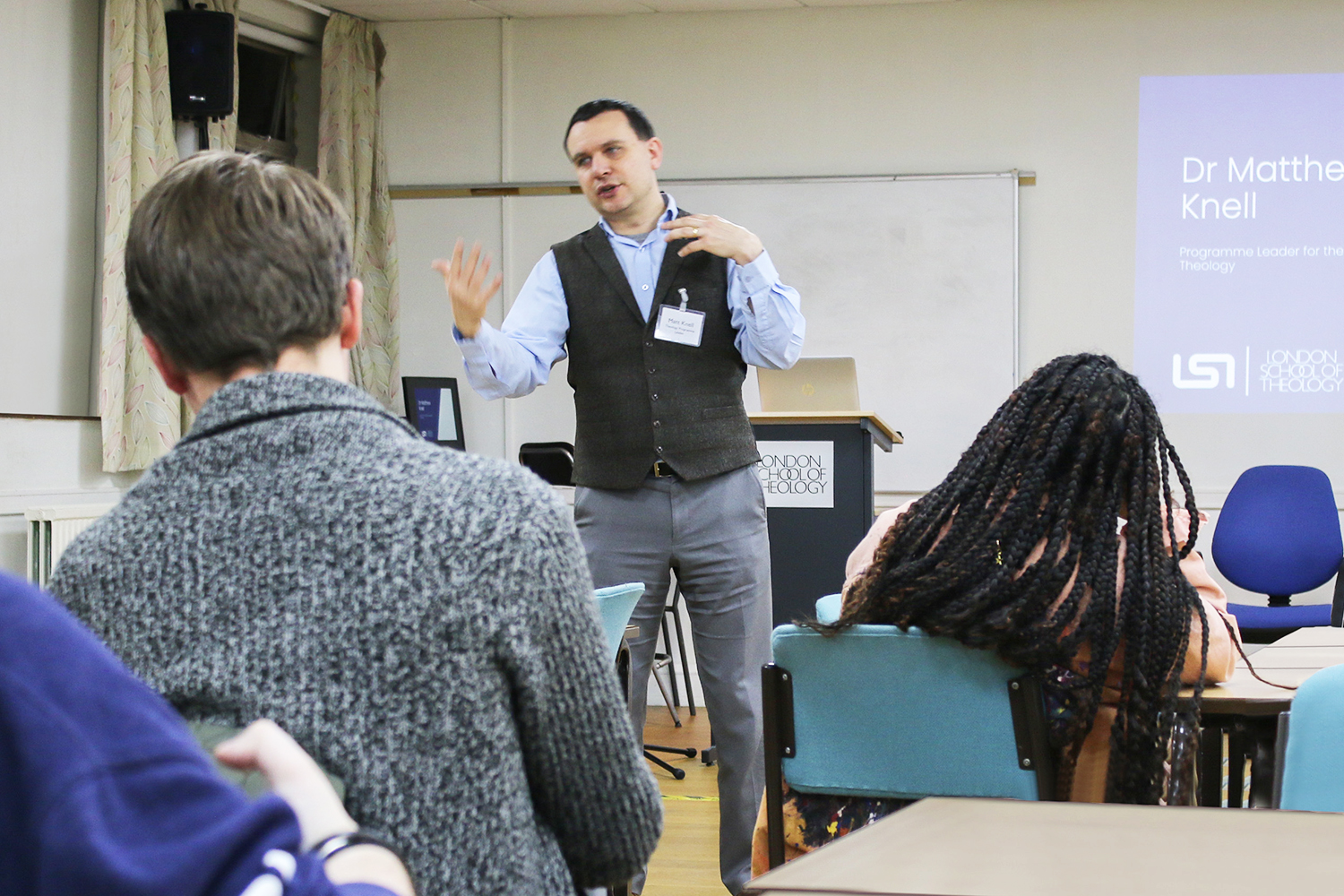Theological education should be accessible to all, so we have a choice of study-modes
On Campus
All our undergraduate programmes and some postgraduate programmes, can be studied onsite at our campus in Northwood. Many research students are also based onsite. On-campus programmes are delivered in three terms over two semesters, from October until April. Lectures are timetabled Monday to Friday, from 9am until 6pm. Some optional modules are offered as intensives over one week.
All our programmes require students to be actively involved with their learning, engaging with both tutors and fellow students. Students studying on campus are able to be part of an active onsite community, interacting with other students and lecturers on a daily basis.
Students are encouraged to engage with one another both in and out of the classroom. Often the best discussions and the ‘eureka’ moments arise as students process their learning together through conversation in social settings.

Seminars
Undertaken in smaller groups than lectures, seminars are led by faculty and require preparatory work to enable deeper engagement and informed discussions. The smaller groups allow for greater engagement than can be achieved in the larger class setting.
Placements
Placements provide students with an opportunity to apply what they are learning to the ‘real world.’ By identifying, developing and sharing your gifts and skills, you grow in Christian character, explore your leadership potential and are shaped for future life and ministry.
Residential weekends
A more concentrated form of study, students and lecturers go away together for a weekend of classes (Theology & Counselling).
Field trips
With London on our doorstep, lecturers make use of resources such as the British Museum to reinforce lectures.
Assessment methods
• Essays. Written arguments allow students to develop critical analysis skills through engagement around a set question or topic.
• Class Presentations. Engaging in research in order to teach others can be a great way to consolidate learning.
• Examinations. These permit a range of materials to be assessed, particularly in modules with a strong survey or content focus.
• Creative Assessments. Ranging from dramatic performances to creative writing, creative assessments can give students a chance to show a depth of understanding through non-traditional means.
• Practical Assessments. Students are examined on practical skills with tasks and interpersonal interaction.
• Recitals. Students perform in front of an audience and their performance is examined.
Programme materials
Each module includes specially written online units, which contain both an overall narrative and embedded resources including e-books, journal articles, websites and visual media, which will help generate a rich environment for exploration and learning. These materials can be accessed through LSTOnline.
Tutor
Each module has a tutor who is an experienced expert in their field. The tutor’s job is not to ‘lecture’ in the normal sense, but to walk you through the materials and help you to understand and dig deeper. Tutors will be regularly available through the LSTOnline forums to answer questions and discuss content with you.
Fellow students
Online students start and end modules at the same time, which means that there is a studying community in which students can engage with the same materials together. Participating in discussion forums is a key part of the online programme, enabling debate and processing concepts together.
Local context & placement
Like our onsite students, online students are encouraged to participate in ministry in a local context. BA students take placement modules as part of their studies.
Online Learning
If you wish to study at LST but cannot easily come to our campus, we offer the option of studying online.
The BA Theology programme and all of the postgraduate MA programmes are available to be studied completely online, with no requirement to travel to London. BA online modules are delivered over three semesters, from October to August, in five-week blocks, with a group of students studying together with module tutors. MA Theological Studies, MA Biblical Studies and MA Practical Theology and Ministry are delivered over three terms.
Each of our online modules parallels an on-campus module, with the same learning outcomes and assessments, but with its own specifically-created course materials. Online courses are delivered via our Virtual Learning Environment ‘LSTOnline’ and are mainly presented in a written form, including readings from books and articles, but also including videos and audio clips. Students study together in cohorts and interact with each and the tutor in forums.
Online Study FAQs
How does online study work at LST?
Modules are delivered in 5-week study blocks, with students studying 2 units per week. You will study together with a cohort and a tutor. In each unit, after engaging with the study materials, such as ebooks and articles, you will discuss the topic in online discussion forums.
Do I have to be online at a particular time?
No, you can choose what day and time in the week works best for you to study. There are no fixed times to attend, though occasionally tutors may offer an optional online video meetup.
So, no lectures?
There are no timetabled, regular lectures as part of these modules, though the materials include video and audio material. Mostly you should be prepared to do lots of reading.
How will I engage with the tutor and other students?
You will get to know your tutor and other students through the online discussion groups, though these are normally text-based and video meetups are optional. You will also be able to engage with other students through the Tutor Groups and community meetings such as Chapel and prayer meetings.
How do I organise my study time?
You have flexibility in organising your study time, but we normally recommend setting aside fixed days of the week for study so that you have a clear rhythm. Don’t assume you can fit study into odd evenings and weekends as it’s easy for it to get squeezed out.
How much time does online study take?
If you are studying part-time you will need two clear days a week for study. Combining study with full-time work is not recommended. If you want to study full-time you will need to be able to commit 4-5 days a week to your studies (i.e. don’t try to combine with a job or ministry).
How are the online modules timetabled in the year? When are the deadlines?
Starting in October, the online modules are timetabled over three semesters. The first runs from October until Christmas, the second from January to Easter, then the third from May to July. Your assignments will be handed in a few weeks after teaching ends (in January, April and August).
If you are studying part-time you will take one module at a time, if you are full-time you will study two modules at a time (each module takes 2 days per week). Some weeks are set aside as Reading Weeks for you to work on your assignments.
I live a long way away, will I ever need to come to LST?
No, there is no requirement to attend the campus. We have online students studying with us from all over the world.
How will I access library resources?
We have more than 40,000 ebooks in the library as well as journal articles and other materials. All the readings in your modules will be provided for you through the Virtual Learning Environment.
What are the online assessments like?
Each module includes an assignment, which is usually a 2000-word essay. This will be submitted online after teaching has finished.
What is Blended study?
If you live within traveling distance of LST you could choose to take a combination of on-campus and online modules. For example, you could attend campus for two days and study at home online for two days. Note that only the Theology modules are available online – you have to take Music, Worship and Counselling modules on campus.
Blended Study
For those who want the flexibility of mixing study at home and onsite, we offer a programme of blended study.
This method of learning requires focus and commitment, but is greatly rewarding as students become part of both the online and onsite communities.
Our undergraduate BA Theology programme can be studied fully online or in a combination of online and on campus modules. For the Theology & Counselling programme, and the Theology & Worship programme, the theology component of the programmes can be studied online or in a combination of online and on campus modules. Counselling, and Worship Studies modules must be taken at our London Campus (concentrated over 1-3 days).

Benefits
- The ability to combine online and onsite study gives students the best of both worlds. Online students have freedom and flexibility to allow them to continue to serve in their local area, at church or in their workplace and to fit their study around their own timetable. Coming onto campus opens up the opportunity for face-to-face interaction with students and lecturers, as well as offering structured work schedules and access to onsite facilities.
- Blended students create their own personal study plan which enables them to choose what will be studied onsite and what will be studied online.

Tutor
For each module of study, you will be assigned a tutor who is an expert in the subject and experienced in helping students through the nuances of distance learning. They help you understand topics, as well as grade your assessments. The tutors are able to help you with faith-based challenges you encounter along the way.
Life Long Learning
As an alternative to studying for a degree programme, there is an option to study our life-long learning courses. Learning-material is sent by email, which doesn’t require a fast internet connection, with some subjects also available as paper-based learning, to be sent by post.
You can begin studying your choice from a range of subjects, at any time and you can study at your own pace. Distance learning is a well-established method of study with unique strengths. The study material provided will be of high quality: academically, pastorally and spiritually.
